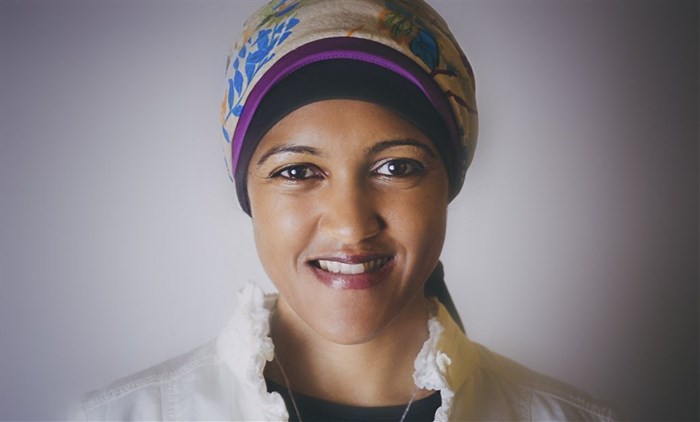






Rogeema Kenny is a Cape Town engineer, author, motivational speaker and activist aiming to bring digital literacy skills to marginalized communities in the greater Cape Town region. Her interest in coding started at university. "I studied electrical engineering and coding formed part of our curriculum. Back then, there were no easy ways to code: we had to sit for hours every day, and if there was a problem with the code it would sometimes take days to find it and fix it. It wasn't very user-friendly – you really had to be determined to even consider a career in coding."
Kenny says she was inspired after attending an Africa Code Week Train-the-Trainer coding workshop at the Cape Town Science Centre. "When I saw Scratch for the first time, I immediately noticed its potential for teaching coding basics to children and beginners of all levels in a fun, interactive and simple way. The coding concepts weren't new to me, but the way it was taught was completely revolutionary. I decided I had to become part of Africa Code Week and take basic coding skills to communities in Cape Town. I had a vision of training 1,000 people, but of course couldn't do that alone."
Africa Code Week is a continent-wide initiative aimed at sparking the interest of African children, teenagers and young adults in software coding. Spearheaded by SAP in 2015 as part of its social investments to drive sustainable growth in Africa, Africa Code Week (ACW) is the story of hundreds of schools, teachers, ministers, community centers, code clubs, NGOs, businesses and non-profits getting together to give birth to the largest digital literacy initiative ever organised on the African continent.
To make Kenny's ambitions a reality, she took the project to The Hope Network, an organisation dedicated to awarding scholarships to talented female students in STEM fields. "There was such a natural alignment between Africa Code Week's vision and The Hope Network that we couldn't miss the opportunity to play a meaningful role in this year's initiative. We pulled the team together and partnered with the Sakhikamva Foundation, then sourced trainers and venues, trained volunteers, installed the necessary software, conducted some marketing to secure bookings, and got our back-office operations up-and-running in record time.
"We wanted to give our attendees a professional experience and make the workshop as accessible as possible to people across Cape Town. This proved to be a bit costly, but luckily we heard of the Africa Code Week Google Micro Grants and immediately applied. We were delighted when our initiative was accepted and we became a 2016 Google Grant recipient."
Google this year provided small grants to organisations and groups to run hands-on coding workshops for kids and youths (ages 5-18) during Africa Code Week, 15-23 October 2016. Recipients of the grants commit to using the funds to each train 100 or more kids during this year's ACW. Over 40 micro grants were awarded by Google across Africa.
Kenny’s connection with Google started when she spent a month in Silicon Valley, working at some of the world's top tech companies.
"Last year I was part of Techwomen, an initiative sponsored by the US State Department that took 99 women from Africa, the Middle East and Central Asia who work in STEM-related fields and placed them in top global tech companies. One of the companies I visited was Google HQ in Mountain View, California. I was impressed by the company's commitment to not only its employees, but to the development of causes they care about. It is apt then that Google was a main sponsor of our Africa Code Week project this year!"
For Kenny, the bigger picture is seeing more talented girls enter STEM fields. "I'd love to see people changing their perspective on coding and to start getting their foot in the door with this exciting field, especially among women. I believe that initiatives, such as Africa Code Week, helps address problems of access to digital literacy by removing barriers to entry.
"Africa Code Week brings together partners from across the public and private sectors to work towards a common goal: developing Africa's next generation of workers to ensure the continent's success in the global economy. Without funding and project support from organisations such as SAP and Google, we would not be able to do the important work of uplifting Africa's youth to the benefit of all who call the continent home."
The 2015 Africa Code Week initiative went viral with over 89,000 youth introduced to coding across 17 countries in 10 days only (over four times the initial goal of training 20,000).
From 15 October to 23 October, thousands of coding activities were organised across 30 countries and online. This year's aim was to engage 150,000 youth across Africa to at least write their first lines of code. While the results for 2016 have not yet been released, the target for 2016 is expected to be exceeded. The results will be released in the third week of November. Africa Code Week’s long-term goal is to empower more than 200,000 teachers and positively impacting the lives of 5 million children and youth within the next 10 years.